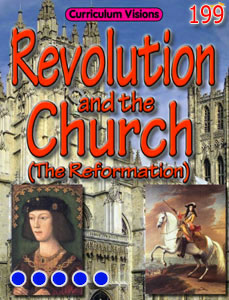All over Europe it was clear to many people that the church was not following the path set out for it by Jesus. Instead, they were using the church to make themselves wealthy. They were corrupt.
In the north of Europe, people were particularly upset by priests who were openly married; the Pope, who was the richest man in Europe, spending money to build huge churches in Rome instead of helping the poor; and members of the church buying their positions. Priests also sold their right to forgive sins to any wealthy person who could afford it.
As usual, simmering disquiet became a revolution due to one man who said the right thing at the right time. That man was a German priest called Martin Luther. By 1517 he had had enough. He wrote down a list of 95 problems he saw in the Catholic Church and nailed the list to the door of a church where anyone could read them.
But now things were different. In 1436 a man called Johannes Gutenberg had made the world’s first printing press. So, when Luther wrote his 95 problems, it was easy to print copies and pass them all over Europe. Within two months, Luther’s ideas had spread across Europe. Soon, people began to see that Luther’s suggestions made sense. They, too, protested against the problems in the Church, and so were called Protestants.
Some of the things that Luther and other Protestants argued for were that priests had no right to stand in between individual people and God, and that everyone should pray to God directly. For example, instead of listening to a priest say mass in Latin, a language few could understand, people should pray together in their own language; and when a person committed a sin, instead of paying a priest for forgiveness, they should ask God for forgiveness in prayer.
Many Protestants also thought churches were too wealthy and too fancy, and thought they should be simple, undecorated buildings without altars or any other barrier between the congregation and the priest.
Many Protestants also thought priests should be allowed to marry, so they could share the life of the community they served and be a part of that community, instead of separate.




